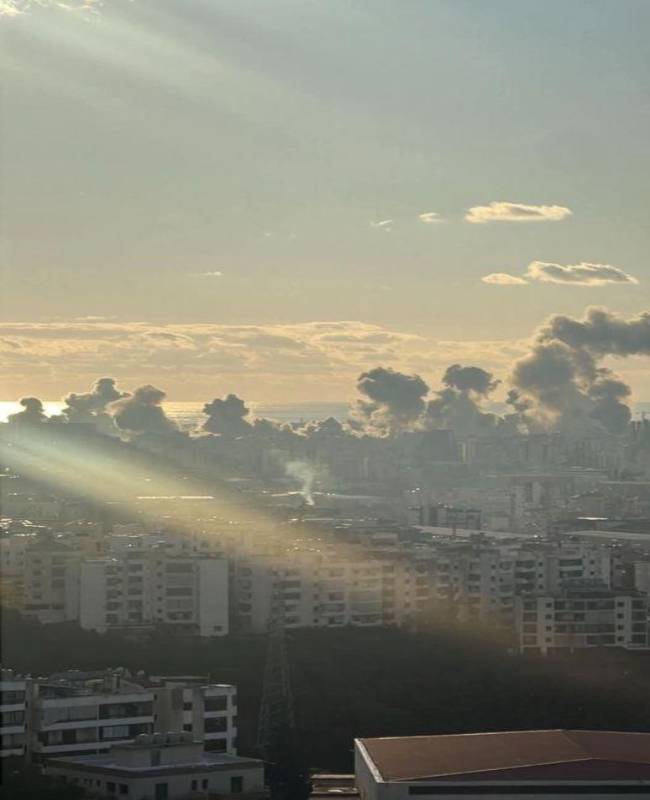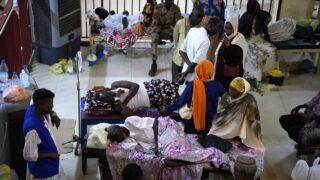Kali Rubaii and Mark Griffiths*
As thousands of people return to their homes in Gaza, South Lebanon, and Syria, they face urgent priorities, among them avoiding unexploded ordinances, accessing water and food, and establishing safe shelter. In addition, handling war debris may pose long-term health risks.
It is urgent to share lessons from Fallujah, Iraq where —two decades since the U.S.-led invasion and almost a decade since ISIS occupation— the enduring health impacts of war are still evident.
Returnees face some of the greatest long-term health risks, namely from exposure to the debris of weapons and destroyed buildings. While much of this is beyond individual control, there are some measures returnees can take to protect their reproductive health.
Lessons from Iraq
When ISIS occupied Fallujah in 2014, Reina (pseudonym) and her young family managed to flee north to the relative safety of Kurdistan. While they were away, ISIS fighters used their house to store weapons; the entire neighborhood was the target of Iraqi and American warplanes.
Reina’s family returned home two years later to find their house partially-destroyed. While her husband worked with others to clean up the neighborhood, Reina cleaned up the rubble of their home almost single-handedly, pulling missile casings and bullet shells from the charred walls and floor. Over a period of weeks, she swept and scrubbed, again and again—all the time breathing in a toxic admixture of concrete dust, munition remnants, and the burned fragments of her home’s interior. She did all of this during the first trimester of her pregnancy.
Her son was born in 2017 with a congenital anomaly. Reina and her family—among thousands of returning Fallujahns—faced the deferred health risks triggered by post-war clean-up activities. Though she has fully restored her home to a space where her son can thrive with adaptions for his disabilities, Reina remains concerned: “I can’t tell if the house is still making us sick.” Her concerns about the enduring presence of war debris are well-founded. More heavily bombarded areas in Fallujah, like Jolan, still have higher levels of heavy metals in the soil than other areas. People like Reina have returned to rebuild over and over, often with military waste burning in the backdrop.
Reina’s story, and thousands of others like hers, contain lessons that are important for those now returning to their homes in Gaza, South Lebanon, and Syria. Returnees like Reina face inevitable exposure to destroyed buildings and both detonated and undetonated weapons. Thus, returning home poses widespread health risks.
Spearheaded by doctors Samira Alani and Abdulqader Alrawi in Fallujah, our research team[1] has conducted an interdisciplinary study on the effects of war on reproductive health, based on exposure surveys, reproductive health histories, dwelling histories, environmental sampling, and biological sampling. Our analysis is not complete, but we know enough to share some preliminary findings that may inform the long-term health of returnees and their birth outcomes.
One key observation is that those who were first to return and rebuild in war-damaged areas may be at a higher risk of reproductive health harms. Returnees are like other first-responders in that they face higher exposure to carcinogens and toxins. In Fallujah, we found that men and women who returned first to bombarded areas and were immersed in postwar cleanup activities may have a higher rate of certain congenital anomalies and have poorer birth outcomes than those who returned later or did not directly participate in rebuilding. This is likely because they were exposed through inhalation to toxins from detonated munitions, incinerated materials, dioxins, and other forms of dust at a much higher rate than those who returned after buildings were restored. Fallujah’s 17-fold increase in birth anomalies is attributed to exposure to the remnants of war, as are manifold other similar spikes in, for example, early onset cancers and respiratory diseases.
The War on Iraq Two Decades On..
04-10-2023
A second observation is that in the process of being displaced, returning, and re-establishing households, nutritional gaps can compound health risks, even for the next generation. A real problem with post-war clean-up is that it happens at the very worst of times: when the body is under-nourished and personal protective equipment is scarce. From our research, we know that post-war clean-up often brings depleted bodies into contact with myriad harmful materials, intensifying reproductive health risks. For example, women’s lack of access to proper nutrition means limited access to folic acid or folate rich foods essential for fetal development. Especially during the first trimester of pregnancy, insufficient folate intake can lead to neural tube defects like spina bifida. This is in addition to handling war debris, some of which can also disrupt folate pathways, intensifying poor birth outcomes.
It is our opinion—based on our ongoing research on the environmental health effects of war—that there is a distinct prospect of Fallujah’s patterns in public health replicating in other heavily bombarded cities and that returnees will bear the double burden of military violence: not only have they suffered widespread death, dismemberment, displacement, and dispossession, but they are also likely to experiences intergenerational health effects yet to come.
Mitigating harm
In spite of limited control over these environments, and more acute risks like contact with undetonated munitions, there are some measures to mitigate long-term health costs.
Limit Heavy Metals Impact: Areas in Fallujah (like Jolan) that saw heavy bombardment 20 years ago still have a higher density of heavy metals in the soil that areas that saw less bombardment. The environmental impact of warfighting is long and the presence of heavy metals is widespread. Vectors include food, drinking water, and inhaled air in the short and long term. We also found uranium and lead in bones[2] of people in Fallujah, which can impact their health as they age.
Take these precautions:
- Having heavy metals in bone tissue is not itself cancer causing. However, taking calcium, vitamin D, and vitamin C can limit both the uptake (metals getting into the body) and release (metals leaving bone tissue and impacting health as one ages) of heavy metals from bone.
- When discarding of munitions casings or any part of a weapon, wear gloves and masks (or kuffieyas).
- Warn children not to play with, touch, or lick any metal objects. Lead can reduce cognitive function and cause other health issues, especially in children.
Limit Risks of Cleanup and Rebuilding: In Fallujah, men and women who returned first to bombarded areas, and who were immersed in postwar cleanup activities, may have a higher rate of certain congenital anomalies (birth defects) and poorer birth outcomes (miscarriage, birth anomaly, stillbirth) than those who returned later or did not directly participate in cleanup/rebuilding. This is likely because their exposure to toxins from detonated munitions, incinerated materials, dioxins, and other forms of dust were much higher. This is also consistent with research on first-responders in other cases. Burning war detritus can accelerate inhalation as well: if you can smell fumes, you are inhaling toxins.
Take these precautions:
- Wear a mask or scarf to limit inhaling fine particles during the movement of rubble, cleaning activities, and reconstruction activities can drastically reduce the risks. While it is hot and cumbersome to do this, men and women may be able to protect future generations’ health by simply covering their nose and mouth.
- Pregnant women should avoid participating in dust-producing cleanup and rebuilding activities as much as possible.
- Do not burn munitions casings or weapons fragments. If possible, avoid burning trash, including plastics, building materials, tires, etc.
- If trash is burned rather than buried, avoid smoke from fires by covering your mouth and nose and moving upwind to avoid inhalation.
Prioritize Folic Acid: Many returnees are experiencing malnutrition, which of course impacts health in a wide range of ways. Women’s lack of access to proper nutrition, especially during the first trimester of pregnancy, can limit fetal development leading to neural tube defects and spina bifida. Women’s lack of access to proper nutrition means limited access to folic acid or folate rich foods essential for fetal development. Especially during the first trimester of pregnancy, insufficient folate intake can lead to neural tube defects like spina bifida. This (in addition to handling war debris, some of which can also disrupt folate pathways) can intensify poor birth outcomes.
Take these precautions:
- Some wheat flour is enriched with folic acid and may be in bread. If you can, look for enriched flour.
- Take folic acid supplement during the first trimester of pregnancy can reduce the chance of NTD or spina bifida.
- If these foods are available, Women in the first trimester of pregnancy —or seeking to conceive— should have priority in their consumption of folic acid supplements and folate rich foods like spinach, broccoli, citrus, eggs, fortified rice, and enriched wheat.
People returning to places like Fallujah or Gaza work hard to rebuild their homes, clearing debris and doing rapid construction, forced to expose themselves to harmful materials that enter their bodies. Though it might seem trivial for people who have survived warfare and displacement to think of masks, vitamins, and folic acid, informed returnees do have some, albeit limited, capacity to shape the health of future generations.
- Kali Rubaii is Assistant Professor of Environmental Health Anthropology at Purdue University (USA)
- Mark Griffiths is Reader in Political Geography at Newcastle University (UK).
- Together they run the research project, War & Geos: the environmental legacies of militarism.
- At Purdue University, Kali Rubaii is the PI of a health research team that includes Dr. Ellen Wells (epidemiology), Dr. Aaron Specht (health physics), and Dr. Ian Lindsay (GIS). ↑
- The research reveals that bone sampling detected uranium in the bones of 29% of study participants in Fallujah, while lead was detected in 100% of participants’ samples. Researchers have never before detected uranium in bones in living populations: in vivo bone X-ray fluorescence (XRF) sampling is groundbreaking in identifying uranium exposure among living populations. What’s more, the amount of lead detected in participants’ bones was 600% higher than averages from similarly aged populations in the U.S. ↑




